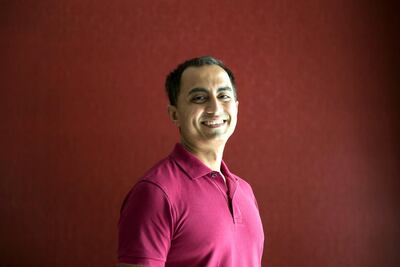When planning for the future, UAE residents have to perform a highly complicated balancing act.
On one side is the mortgage, which needs to be serviced and paid down, on the other is the need to invest for retirement.
Managing these two conflicting priorities is not easy, as both must be funded from a limited pool of income. Get the balance wrong, and you could be heading for a fall.
Dubai residents Manish Punjabi, 40, and his wife Kavita, know all about balancing acts, as they juggle their careers working for multinational technology companies, while raising their 18-month old daughter.
As well as servicing a mortgage and saving for retirement, the Indian nationals, who have lived in the UAE for a decade, now save for school fees as well.
At one point they had two mortgages and were paying a hefty 8 per cent interest rate on one, which they had taken out to buy an apartment in Discovery Gardens in 2008, which they now rent out.
“This was very expensive so we closed the loan last November, paying it off with our savings, which I calculate has saved us Dh27,000 in interest payments,” says Mr Punjabi.
He took great care when taking out a mortgage for their new Dh3.1 million apartment in The Greens, which they bought in 2016 with a 25 per cent downpayment. “We compared deals from eight different banks, using an Excel spreadsheet to calculate the total interest payable over the period of the loan, and found that HSBC offered us by far the best deal,” he says.
They found that mortgages with low initial interest rates often turned out to be the most expensive in the longer run. “Total interest payable over the 17-year term ranged from as little as Dh811,000 to as much as Dh1.1m,” Mr Punjabi says.
HSBC, which launched home loans for Abu Dhabi properties last week in response to increased demand from customers, charges the couple a competitive 1.95 per cent plus Eibor, with the freedom to repay up to 25 per cent of the principal at any point, and zero early settlement fees after the first three years.

Mr Punjabi also negotiated the processing charges from 1 per cent to 0.5 per cent. “My advice to anybody setting up a mortgage is to negotiate at every stage,” he says.
Now the couple have two apartments in the UAE, as well as stocks and shares, and gold. “We are also saving towards Myra’s education and investing monthly in global stock markets, again, using HSBC because we were so impressed by how they handled our mortgage. We are also keen to overpay the mortgage if possible, to give us further financial security.”
The couple appear to have struck the right balance. So which should be the first call on your pocket: paying down your mortgage or investing in a pension?
_________
Read more:
Real estate the best asset class of the moment but gold could be the next crypto
Why every long-term expat should buy a property in the UAE
How will higher interest rates affect your finances in the UAE?
Weighing up the pros and cons of buying a house
_________
Until recently, it made sense to take out a mortgage at rock bottom interest rates to invest in property that might grow by double digits year after year, especially if it generated rental income as well.
However, with global residential property prices slowing and the US Federal Reserve hiking interest rates, the argument is not so clear. Nobody wants to end up with debt they cannot afford to repay.
Vijay Valecha, chief market analyst at Century Financial Brokers in Dubai, says you need to balance the cost of investing in property, against your likely return. “If your mortgage charges 4 per cent a year and your expected investment return is 9 per cent, it makes sense to invest rather than paying off debt.”
If those numbers reverse, then so should your priorities.
Whether you have financial backup if your investment goes wrong should also dictate your decision, he says. "Someone with low risk tolerance is advised to pay off debt first.”
As a rule, Mr Valecha suggests that a high net worth person with preferential mortgage rates and tax benefits should maintain a mortgage, while middle and lower income families should prioritise paying their debt.
Two thirds of UAE residents still believe property offers the best returns for retirement savings, according to the HSBC’s Future of Retirement 2017 study.
Kunal Malani, regional head of customer value management, MENA & Turkey, at HSBC, says property is actually a great retirement investment. “It gives you the stability of a roof over your head. Or you could invest in a rental property and use the income to cover your retirement expenses.”
By finding the most competitive mortgage you can free up money for retirement savings, and there are still attractive deals out there.
For example, on approved UAE properties HSBC currently offers interest rates starting from 3.24 per cent up to 80 per cent loan-to-value for UAE nationals, and 75 per cent for expats.
The flexibility to make overpayments of up to 25 per cent of the outstanding loan amount, and no early settlement charges after three years, allows you to pay down debt faster if you wish.
Sam Wani, a certified mortgage adviser and general manager of Independent Finance in Dubai, says property has shown itself to be one of the best asset classes for long-term investors.
He says ideally, investors should put down a 40 per cent cash deposit and take out a mortgage to cover the remaining 60 per cent. “A small property portfolio with this kind of leverage structure, rented out and properly managed, can build substantial equity over time and be an ideal pension plan.”
Mr Wani advises against putting all your investment portfolio in real estate. “The ideal investment basket would also include mutual funds, low-cost passive exchange traded funds (ETFs), stocks and shares and gold.”
Faisal Durrani, partner and head of research of global residential property sales and lettings experts Cluttons, argues that investing for retirement and paying off your mortgage are complementary goals. “Your home is an investment in your future and a store of equity that can be freed when the time comes to downsize.”
He says too many UAE expats treat property as a short-term investment to sell when they move on. "This leaves you exposed to short-term property market volatility. Instead, you should see property as a long-term investment.”
Toby Johncox, principle representative of mortgage brokerage Enness in Dubai, says the decision to pay down your mortgage may depend on whether the property is your main home or a buy-to-let investment. “Buy-to-let investors should generally focus on reinvesting, rather than paying down debt. Hopefully, the assets across your portfolio will have increased in value by the time you retire, and can be sold to pay off the debt.”
There may also be tax advantages to running mortgage debt, Mr Johncox adds. “UAE investors in UK real estate, for example, often use mortgage debt to mitigate inheritance tax liability, because it is deductible from the net value of your estate.”
While higher interest rates will drive up the cost of property investment, he expects rate rises to be small and incremental. “It will be some years before property finance is considered expensive, so this is not a major worry.”
If you are concerned, protect yourself with a five or even 10-year fixed rate mortgage, which makes financial planning easier as you know your monthly repayments well into the future, Mr Johncox says.
________
Read more:
My Dubai apartment is in negative equity. Can I hand it back to the bank?
Check list for purchasing an investment property in the UK
London property market likely to continue price drop in 2018
Homefront: What happens to absconders that flee mortgaged Dubai properties in negative equity?
_________
Lukman Hajje, chief commercial officer of Propertyfinder Group in the UAE and chairman of Mortgagefinder, says the UAE mortgage cap law requires salaried employees to pay off their loans by age 65, or 70 if self-employed, giving a clear target date.
Stringent UAE lending criteria means that for most people repayments are manageable, he adds. "If you are able to get approved for a loan, the chances are you can afford it. Mortgage rates continue to be reasonable and repayments are typically lower than the rental equivalent on most properties under Dh5 million,” says Mr Hajje.
The real threat comes not from your mortgage, but high-interest unsecured debt such as credit cards and personal loans. "Live within your means, borrow only to purchase income producing or capital value appreciating assets, and stay on top of all your debt repayments,” says Mr Hajje.
You then have to draw up an investment plan, one that takes into account your personal circumstances and objectives. “Do you require income, or are you a long-term investor chasing capital growth? Are you seeking to grow your assets, or preserve those you have? The stock market may offer greater long-term returns, but can you withstand the short-term volatility? Ultimately, these decisions are down to you,” says Mr Hajje.
Stuart Ritchie, a chartered financial planner at AES International, says his clients often instinctively focus on paying down debt, but this can be the wrong priority. “There are actually many benefits to continuing to carry a mortgage, especially as the interest is currently inexpensive.”
Personal factors also play a part, so a conservative investor in a low tax bracket with a high mortgage rate might focus on getting that debt down. “However, a younger, more aggressive investor in a high tax bracket with a low 30-year fixed mortgage rate should find investing the better option.”
Mr Ritchie quotes legendary investor Warren Buffett who said: “If I knew where I was going to live for the next five years or 10 years, I’d buy a home and I’d finance it with a 30-year mortgage. It’s a terrific deal.”
Despite this ringing endorsement, it is worth noting that Mr Buffett, the third richest person in the world, made his $86 billion fortune mostly from investing in stocks and shares. A combination of the two sounds ideal. Just make sure you get the right balance for you.

